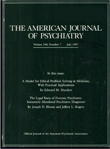Effect of prefrontal repetitive transcranial magnetic stimulation in obsessive-compulsive disorder: a preliminary study
Abstract
OBJECTIVE: Prefrontal mechanisms are implicated in obsessive-compulsive disorder. The authors investigated whether prefrontal repetitive transcranial magnetic stimulation influenced obsessive-compulsive disorder symptoms. METHOD: Twelve patients with obsessive-compulsive disorder were given repetitive transcranial magnetic stimulation (80% motor threshold, 20 Hz/2 seconds per minute for 20 minutes) to a right lateral prefrontal, a left lateral prefrontal, and a midoccipital (control) site on separate days, randomized. The patients' symptoms and mood were rated for 8 hours afterward. RESULTS: Compulsive urges decreased significantly for 8 hours after right lateral prefrontal repetitive transcranial magnetic stimulation, but there were nonsignificant increases in compulsive urges after repetitive transcranial magnetic stimulation of the midoccipital site. A shorter- lasting (30 minutes), modest, and nonsignificant reduction in compulsive urges occurred after left lateral prefrontal repetitive transcranial magnetic stimulation. Mood improved during and 30 minutes after right lateral prefrontal stimulation. CONCLUSIONS: These preliminary results suggest that right prefrontal repetitive transcranial magnetic stimulation might affect prefrontal mechanisms involved in obsessive-compulsive disorder.



